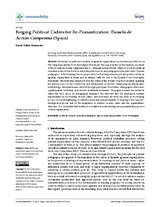Forging Political Cadres for Re-Peasantization: Escuela de Acción Campesina (Spain)
Autor
Gallar Hernández, David
Editor
MDPIFecha
2021Materia
Political subjectsPeasant pedagogies
Agroecological peasantry
Food sovereignty
METS:
Mostrar el registro METSPREMIS:
Mostrar el registro PREMISMetadatos
Mostrar el registro completo del ítemResumen
Bolstering the political formation of agrarian organizations has become a priority for La Vía Campesina and the Food Sovereignty Movement. This paper addresses the Spanish case study of the Escuela de Acción Campesina (EAC)—(Peasant Action School), which is a tool for political formation in the Global North in which the philosophical and pedagogical principles of the “peasant pedagogies” of the Training Schools proposed by La Vía Campesina are put into practice within an agrarian organization in Spain and in alliance with the rest of the Spanish Food Sovereignty Movement. The study was carried out over the course of the 10 years of activist research, spanning the entire process for the construction and development of the EAC. Employing an ethnographic methodology, information was collected through participant observation, ethnographic interviews, a participatory workshop, and reviews of internal documents. The paper presents the context in which the EAC arose, its pedagogical dynamics, the structure and the ideological contents implemented for the training of new cadres, and how there are three key areas in the training process: (1) the strengthening of collective union and peasant identity, (2) training in the “peasant” ideological proposal, and (3) the integration of students as new cadres into the organizations’ structures. It is concluded that the EAC is a useful tool in the ideological re-peasantization process of these organizations.

